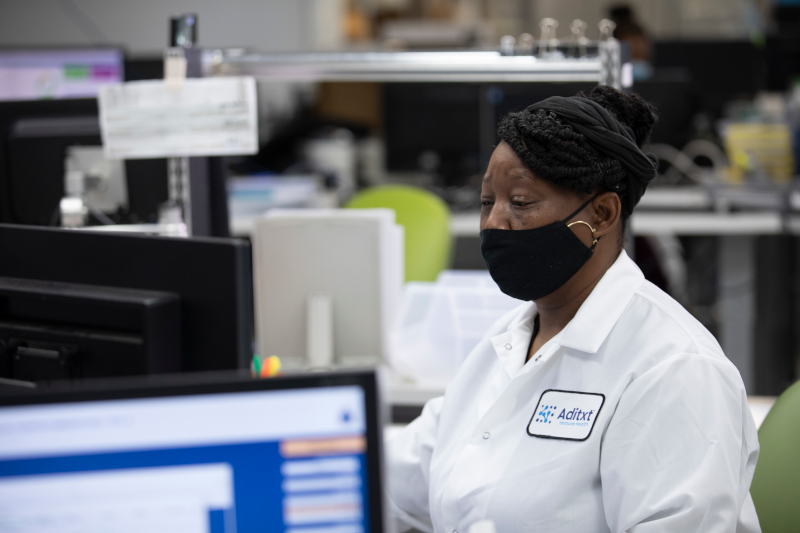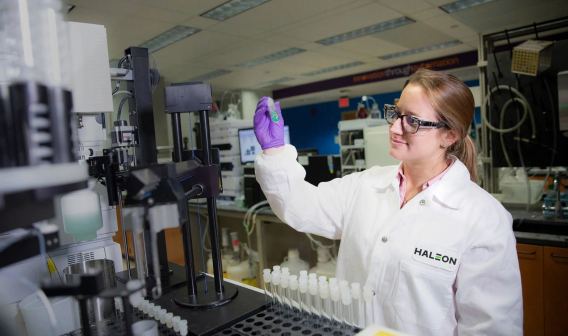From Incubation to Collaboration
Universities, VA Bio+Tech Park Draw Investment to Richmond
For communities seeking to recreate the success of well-known life sciences clusters in Boston, San Diego, and the San Francisco Bay Area, Genetic Engineering & Biotechnology News suggests there’s a straightforward formula to replicate. It begins with proximity to world-class research science centers and adds in access to talent and funding, a strong quality of life, available and adaptable lab and office space, and an entrepreneurial environment. This formula might just explain the bioscience boom in Richmond and Petersburg.
“There is a significant talent pool already located in the area from which startup companies can pull,” said Chandra Briggman, president and CEO of Activation Capital, the nonprofit behind the VA Bio+Tech Park in downtown Richmond. “In addition to the talent located here, over $300 million has been invested in bioscience firms in the region since 2010, and Virginia Commonwealth University (VCU) has more than $360 million in sponsored funding directed to its research. Our location also is a huge advantage, as Richmond is within two hours of key federal agencies.”
The VA Bio+Tech Park is doing its part to give entrepreneurs in Richmond space to grow. The 34-acre life sciences community is itself home to nearly 70 companies, as well as a life sciences and advanced technology incubator, the Bio+Tech Center. The center provides below-market-rate office and lab space and support resources, including shared equipment, discounted services, programming, and a community of life sciences professionals with whom to connect.
Helping Startups Become Sustainable
Pharmaceutical company Kaléo traces its roots to a 2004 project within the incubator. Today, the company manufacturers the AUVI-Q® (epinephrine injection) auto-injector, but its current success was grounded in startup support. “Our founders received the help and support they needed to obtain capital investment, develop our intellectual property, recruit key talent, and achieve FDA approval and commercial launch for our products,” said CEO Ron Gunn.
Being in a community with other life sciences companies that have progressed through startup growing pains to become leaders in their field carries a tremendous amount of value. “Collocation allows for collisions and knowledge-sharing amongst peers and also people in industry sectors you may not otherwise come into contact with on a regular basis,” Briggman said. “Being collocated with academia, government labs, private companies, and the health system allows for collaboration and innovation.”
Across organizations in Richmond, this collaboration seems particularly impactful. As Gunn put it, the region is home to a “strong collaborative spirit among the colleges and universities, and the bioscience community creates an environmental mindset that is rich with innovation and entrepreneurial spirit.”
“It’s very much a ‘rising tide lifts all ships’ mentality here,” said Dr. Elaine Horn-Ranney, co-founder and CEO of medical device company Tympanogen, Inc., in Richmond. “The people here were collaborative and supportive as we were going through those early growing pains of the company.”
Horn-Ranney launched Tympanogen in 2014 to develop gel patch solutions that can, among other things, transform hours-long eardrum repair surgeries into brief office visits. Horn-Ranney said the company’s location and her membership within the Richmond-based Virginia Biotechnology Association, where she serves on the board, have provided access to a close community of technology professionals facing many of the same challenges.
Community Connections
Access to VCU’s Life Sciences resources also helps. The VCU Life Sciences program was created in response to the need to prepare students for anticipated growth in new life sciences jobs that require highly interdisciplinary or multidisciplinary approaches, compared to traditional medical or scientific fields. VCU’s pharmaceutical engineering doctoral program, launched in 2020, is the first of its kind in the country.
VCU Life Sciences is home to the Center for Biological Data Science, which is helping drive research around bioinformatics, genomics, proteomics, and computational systems biology, as well as the Center for Integrative Life Sciences Education, which encourages student research across multiple disciplines. These centers bring together a host of expertise that also spans the Bio+Tech Park and the adjacent VCU Medical Center, while VCU and the region’s other colleges and universities provide a sustainable talent pool.
Finding and training employees to meet the specialized needs of a life sciences company takes time and money, but Virginia startups have resources available to defray those costs. When California-based Aditxt, Inc., opened its AditxtScore™ Center, the first phase of its $31.5 million Richmond investment, it did so with support from VEDP’s Virginia Talent Accelerator Program.
Collocation allows for collisions and knowledge-sharing amongst peers and also people in industry sectors you may not otherwise come into contact with on a regular basis. Being collocated with academia, government labs, private companies, and the health system allows for collaboration and innovation.
This high-capacity, Clinical Laboratory Improvement Amendments-certified immune monitoring center aims to scale up to process a projected 10 million immune system reports. That requires skilled individuals who can process the reports that help individuals decode their immune profiles. The company plans to create more than 300 new jobs over the next three years to meet demand. The Virginia Talent Accelerator Program, delivered in partnership with the Virginia Community College System, provides job-specific training services customized for the company’s unique needs, as well as recruiting support. Aditxt CEO Amro Albanna cites this combination of “skilled workforce, location, and infrastructure” as the reason that Richmond presented an ideal location for the company’s first high-capacity AditxtScoreTM Center.
It's very much a 'rising tide lifts all ships' mentality here. The people here were collaborative and supportive as we were going through those early growing pains of the company.
The Richmond location for Pharmaceutical Product Development, LLC (PPD) — now part of Thermo Fisher’s Laboratory Products and Services Segment — has also benefited from the wealth of talent available from local universities. The global contract research organization has an associate group leader serving among the Employer Advisory Board members guiding VCU Career Services in strengthening relationships between employers and the university.
Richmond and nearby Petersburg are home to an emerging pharmaceutical cluster surrounding the VCU-based Medicines for All Institute aimed at reducing shortages of essential medicines in the United States. The host of expansions happening across the Richmond area today will only serve to strengthen the infrastructure available. As Horn-Ranney puts it, “As a whole, the state is on a very good pathway to being a major presence in the biotech and healthcare space.”





